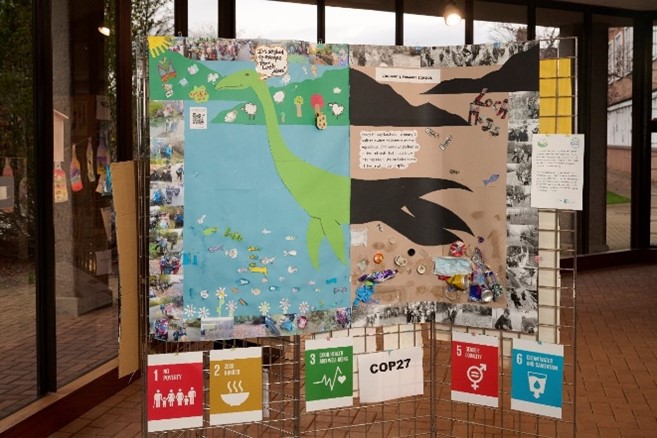“art is always about reappraising the way we look at the world. It can speak more eloquently than propaganda because it can inject emotion into facts” (Parker, n.d.), conveying information in ways, that “create the empathy, emotional engagement and cultural understanding needed to bridge the gap between climate science and effective climate policy” (Abrahams et al. 2016)
This ‘Connecting Communities and Heritages against Climate Crisis’ programme builds on the success of the Open University in Scotland ‘MockCop27’[1] initiative with Highland One World (a global learning centre). Working with primary schools around the time of the COP meeting in Glasgow, children were invited to produce pieces of art from recycled materials, focusing on a Sustainable Development Goal (SDGs), in order to inspire others to act. The picture associated with this article is one output from these activities.
Picture: A collage is displayed on a metal frame with some of the SDGs in an open room. The collage features the Loch Ness monster split into two with one side representing how a healthy and happy Nessie might look in her natural environment and the other side showing a sad view, with collected rubbish included in the collage. Nessie is surrounded by photos of school pupils taking part in various outdoor activities around the Highlands area relating to sustainability. (Photo with thanks to Ewen Weatherspoon)
The submitted pieces of art were displayed at the Highland Council chambers in Inverness while the Mock COP took place to allow Highland Council staff and visitors to see the work. The ‘artivism’ project encouraged schools to explore the SDGs and research related issues, allowed pupils to transition their learning into informed action, and gave them a voice and advocate for change directly with policy makers during COP27.
Expanding this initial work to Wales and beyond, initially to Nigeria, our programme aims to;
- build awareness amongst children/young people, their families and school/local communities about mitigation and adaptation for climate change in their local area.
- encourage two-way intergenerational sharing of mitigation and adaptation methods through cultural channels based around local materials, language, and heritage.
- promote sharing of this knowledge between different cultures – Scotland, Wales and beyond.
- encourage an understanding of the ways in which art can be used to raise awareness of social and environmental issues and help create social change.
References
Abrahams, G., Gallatly, K., and Johnson, B. (2016) Art+Climate=Change. Melbourne, Aus: Melbourne Univ. Publishing.
Parker, C (undated) Tackling the Climate Emergency | Tate (accessed 17.12.23)
Taboroff, J., Coute, P., Orr, S.A., Ali, S. with al Shawesh, S. and Roda Technology Ltd (2023) Climate Change Impacts on Cultural Heritage: Draft Final Report, London: British Council WOR-2484J.
[1] COPs (Conference of the Parties) are global climate conferences, where governments from around the world agree on policies to tackle climate change. Each year is given a number. This year COP, numbered COP28, took place in the United Arab Emirates from November 30 to December 12, 2023. Mock COPs are parallel exercises which involve local debate modelling the international conferences. In the case of the MockCop27 in Inverness, the debates involved school children.
